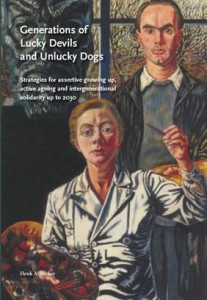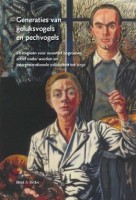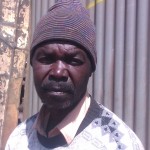The ICT-Generation, Also Virtual Generation
No comments yet Roots
Roots
In the Netherlands about one thousand schoolchildren are sick and have to stay at home. An organisation called ‘Classcontact’ is responsible for the communication between the healthy and the sick members of the classes. All members of a class communicate with eachother by video conferencing. This arrangement aims at avoiding that the sick children feel lonely and that they get excluded from the lessons.
This arrangement is possible because these schoolchildren belong to cohorts that have experienced the ICT-revolution during the formatieve period in their lifecourse (1). The children belong to the ICT-Generation’, also called virtual generation (2). Members of this generation have in this period profited from a relatively high level of intelligence and a relatively high memory capacity. They will profit from these experiences during the rest of their lifecourse, although the impact will shrink and the content will change somewhat in the course of time.
In this bonus chapter I will first discuss the charateristics we can expect of the ICT-generation in the future, looking at a number of areas in society. Second, I will look at the strategies that will have to be applied. Third, the perspectives for the ICT-generation will be explored.
2.Areas of activities
The first area to be discussed is education. All members of the virtual generation will profit substantially from the experiences during their formative period. They have learned much about virtual communication and about handling computers. They have also acquired a relatively high level of communicating in English.
They will profit much from distance learning. An example of this kind of education are the Open Universities active in many countries in the Western World. Also distance learning will enrich the opportunities on the labour market for youngsters in developing countries a soon as they try to find a job in a developed country. These opportunities will lead to government meaures to keep them in their home country and to avoid migration to a developed country. If they live in a safe area, there will be no reasons for emigration. We are confronted here with a structual reduction of mass migration towards developed countries.
Also training and coaching will have an important impact upon the lifecourses of the ICT-generation. The members of this generation will try hard to acquire knowhow about practical activities. In particular coaching will improve their opportunities on the labour market. An example of coaching in schools was presented at the beginning of this bonus chapter.
The opportunities involved are present in particular in the area of administration. Already in our time many enterprises in the Netherlands and other Western countries engage administrative workers in countries like Rumania and Slovacia in programming in the sector of administration and bookkeeping.
Furthermore medical care presents many examples of distance work suited for members of the ICT-generation. As an example we can take handling of care-robots at a distance. This activity requires knowhow about robotica. This kind of knowhow the members of the ICT-generation can acquire without too much trouble.
As a last example we will take a look at surveyance. For instance surveyance by cameras.
3.Strategies
In the next five to ten years of its existence the ICT-generation will have to design and practice strategies that
first, provide optimal profits of the abilities of its members in handling ICT,
second, lead to optimal profits from distance workers worldwide,
third, lead to optimal cooperation with members of other generations,
fourth, reduce mass migration of economic refugees living in safe areas.
In the area of education in the next five to ten years the members of the ICT-generaion will not have yet enough training and experience to act as high-quality teachers. The members of this generation will contribute assistance that requires strategies that will be inspired by the practices described in the beginning of this bonus chapter, dealing with the support of schoolchildren that have to stay at home.
The same kind of strategies is required in the area of training. Members of the ICT-generation need strategies to act as assistants. For instance training in handling knowledge and know-how regarding the pattern of generations. This training will be supported by the book Generations of Lucky Devils and Unlucky Dogs.
With regard to coaching the members of the ICT-generation will in the next five to ten years already be able to act on a high level. As an example we can take the coaching of economic refugees that are admitted to developed countries. Distance work based on ICT will take place worldwide.
Next administration requires our attention. In bonus chapter 2016-3 experiences with distance programming are described. Young experts living in a country in the East of Europe contibute programming to enterprises situated in the Netherlands, England and other countries in the Western World.
In the area of medical care members of the ICT-generation can support patients that have to stay at home. They will supervise these patients and organize social contacts.The same kind of distance work can be practiced to support senior citizens living alone and in need of social contacts. These activities require strategies inspired by activities already existent.
Also surveyance will have to be contributed by members of the ICT-generation. In particular surveyance based on cameras. For instance camera surveyance in the centers of our large cities. In Generations of Lucky Devils and Unlucky Dogs examples of Amsterdam are presented.
These strategies require a lot of support. For instance if the producing position or the receiving position cannot be reached by daylight. Often night shifts will be require.
4.Perspectives
We may expect that the European Commission will stimulate pilot studies and will contribute to the finances required for these activities.
We also expect that distance work will grow fast in the next years. Furthermore we expect that the book Generations of Lucky Devils and Unlcky Dogs will contribute substantial to these developments.
A lot of problems still require attention. For instance we need safeguarding of the copyrights of specific texts published in a living document.
5.Next steps
First. I will send this version of Bonus Chapter 2016-2 to a translation bureau to correct my mistakes in the use of the English language.
Furthermore, I will supplement Bonus Chapter 2016-3 with new information.
Also, I will add new information to my autobiography.
NOTES
(1) Henk A. Becker (2011) Generations of Lucky Devils and Unlucky Dogs. Amsterdam: Rozenberg Publishers. Page 33.
(2) IT Generation, Barendrecht.
You May Also Like
Comments
Leave a Reply









